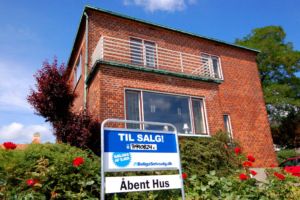News
Bubble trouble: Housing market across Denmark faces dramatic change next week
This article is more than 8 years old.
Real estate economists expect drastic impact as authorities crack whip on bank loans

Might not be the best time to get a mortgage if you can barely afford it (photo: Flickr/Boliga Selvsalg)
There is little doubt that since the recent financial crisis ended, housing prices in Denmark have skyrocketed to a point when talk of ‘housing bubbles’ have once again came to the fore. But those discussions could very well dissipate soon.
From Monday morning, tens of thousands of homeowners in the Copenhagen and Aarhus areas will wake up to a whole new housing market reality as the Business Ministry moves to avoid a repeat of the bubble burst of yesteryear.
In collaboration with the Danish financial supervisory authority Finanstilsynet, the Business Ministry has moved to severely restrict banks and credit institutions from offering the types of housing loans that don’t have fixed interest rates and monthly instalments.
In future, the more ‘risky’ interest rate and repayment-free mortgages must only constitute 15 percent of the mortgage lending portfolio of banks. The impact could be overwhelming, according to the banks.
“I don’t think people are aware that these changes are on the way, and that they can have quite significant consequences for very many homeowners,” Lise Nytoft Bergmann, a real estate economist with Nordea bank, told Politiken newspaper.
“Many people think that this just affects the inner cores of Copenhagen and Aarhus, but there are a long line of other Capital Region municipalities that will be impacted by the new rules – including Ballerup, Albertslund and Ishøj.”
Bergmann urged homeowners in the affected municipalities to look into the new rules, whether they are new to the home owner market or not.
Downward trajectory
With fewer loan options at the disposal of prospective homeowners, it is likely they will instead seek to find housing in municipalities that aren’t affected by the new directive, such as Furesø and Egedal. That is in turn expected to curb the rapid price increases in those municipalities encompassed by the new rules.
Some experts, however, contend that the state’s effort to put a damper on the housing price spike is too stringent and could lead to a downward spiral.
“The new rules will curb price development in the impacted municipalities, and that’s basically the purpose of them. But as regards the bigger picture, there are a lot of other initiatives aiming to tackle the price development – primarily through a tax reform,” Mikkel Høegh, a real estate economist with BRF Kredit, told Politken.
“So we are afraid we will see the opposite of a bubble: a downward trajectory that will completely deflate the housing market.”
Other experts indicated that pensioners could be the big losers in the move, as their income is usually low and the new rules don’t take their assets or equity in their housing into account. Another group that will be hit hard is parents looking to buy housing for their children through the so-called ‘forældrekøb’ (parental buy) scheme.










































